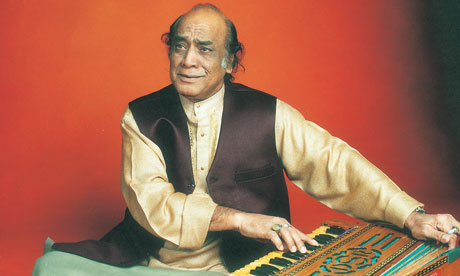Wednesday, 27 June 2012
KOLAVERI FLASHMOB 4 BARCELONA.Fonts de Montjuïc 2012. Magical Bollywood
Friday, 15 June 2012
Mehdi Hassan obituary
Singer known as 'the emperor of the ghazal'

Mehdi Hassan became an abiding cultural bridge between India and Pakistan. Photograph: Navras Records
Mehdi Hassan, who has died aged 84, was the Indian subcontinent's outstanding male exponent of the ghazal, a form of sung Urdu lyric verse, set to the appropriate raga melodies. Urdu poetry, which springs from the Persian, is filled with pathos, yearning, political and social injustice, loss, unrequited love and pleasure. Hassan evoked these with rare mastery, which is why devotees and eager students flocked to hear him from far and wide. It is claimed that he sang more than 50,000 ghazals during his lifetime, becoming known as the "emperor of the ghazal".
Born into a family of kalawants (professional musicians) in the village of Luna, now in the state of Rajasthan, he was taught by his father, Azeem Khan, and uncle, Ismail Khan. Dhrupad, an ancient, austere musical style, was their forte and they instilled it in the boy. While still in his teens, Hassan was recognised as a rising talent and was invited to sing for the maharajahs of Jaipur and Baroda.
However, in 1947 came independence and the creation of Pakistan, and the future of the Indian princes, upon whom the musicians were traditionally reliant, became insecure. Hassan's family, who were Muslims, migrated to Pakistan.
The new country was in turmoil and there was no opening for a young man whose only trade was music. Hassan managed to get a job in a bicycle shop and graduated to become a tractor driver and mechanic. But at night, he persevered with his vocal exercises.
He soon realised that the Pakistani people had an appetite for the ghazal, so he applied himself assiduously to the study of Urdu, particularly Urdu poetry. With his knowledge of ragas and the sentiments associated with them, he discovered that he had a tremendous advantage as a composer who could marry verses to melodies.
Hassan first appeared on Radio Pakistan in 1952 and after that, his success was meteoric. Leading poets such as Faiz Ahmad Faiz, Ahmad Faraz and Qateel Shifai were happy to have their verses set to haunting music and sung by him. Hassan was now associated with the literary and musical elite. His voice featured on the soundtrack of many Pakistani films, and ghazal singers on both sides of the border paid homage to him.
• Mehdi Hassan Khan, singer and composer, born 18 July 1927; died 13 June 2012
Born into a family of kalawants (professional musicians) in the village of Luna, now in the state of Rajasthan, he was taught by his father, Azeem Khan, and uncle, Ismail Khan. Dhrupad, an ancient, austere musical style, was their forte and they instilled it in the boy. While still in his teens, Hassan was recognised as a rising talent and was invited to sing for the maharajahs of Jaipur and Baroda.
However, in 1947 came independence and the creation of Pakistan, and the future of the Indian princes, upon whom the musicians were traditionally reliant, became insecure. Hassan's family, who were Muslims, migrated to Pakistan.
The new country was in turmoil and there was no opening for a young man whose only trade was music. Hassan managed to get a job in a bicycle shop and graduated to become a tractor driver and mechanic. But at night, he persevered with his vocal exercises.
He soon realised that the Pakistani people had an appetite for the ghazal, so he applied himself assiduously to the study of Urdu, particularly Urdu poetry. With his knowledge of ragas and the sentiments associated with them, he discovered that he had a tremendous advantage as a composer who could marry verses to melodies.
Hassan first appeared on Radio Pakistan in 1952 and after that, his success was meteoric. Leading poets such as Faiz Ahmad Faiz, Ahmad Faraz and Qateel Shifai were happy to have their verses set to haunting music and sung by him. Hassan was now associated with the literary and musical elite. His voice featured on the soundtrack of many Pakistani films, and ghazal singers on both sides of the border paid homage to him.
Hassan thus became an abiding cultural bridge between India and Pakistan. He often returned to visit the village of his birth. His popularity in India was immense, and whenever he performed there he was heaped with garlands and gifts and showered with awards. The Indian singer Lata Mangeshkar, with whom he recorded a duet in 2009, compared his singing to "the voice of a god".
He toured the world to packed auditoriums. His visit to the Hindu kingdom of Nepal was particularly memorable. While singing one night at the palace of King Birendra, he was so exhausted after a gruelling schedule that for a moment his concentration faltered and he hesitated. The king, an ardent admirer of the singer, knew the ghazal well. He immediately stood up and sang, as best he could, the next verse. Hassan raised his hand to acknowledge the king's assistance and then rendered the verse as only he could.
For the last few years Hassan had been in poor health. He was twice married. Both his wives predeceased him. He is survived by nine sons and five daughters.• Mehdi Hassan Khan, singer and composer, born 18 July 1927; died 13 June 2012
Subscribe to:
Comments (Atom)